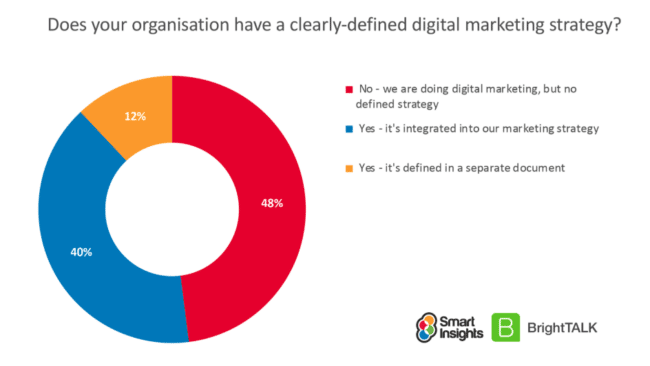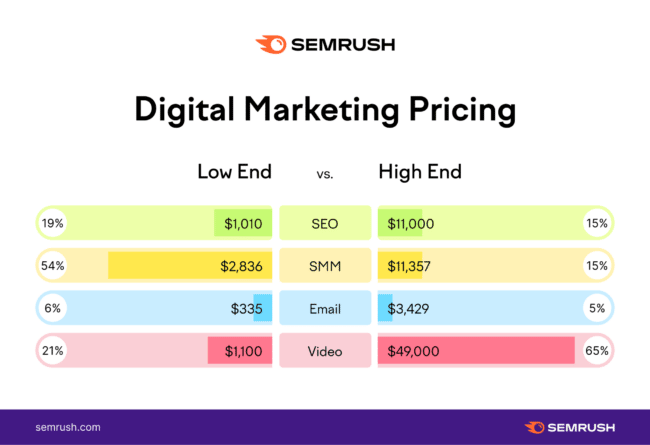Looking for a new digital marketing agency who can accelerate your results? Schedule a free marketing evaluation with our team to meet the right agencies fast. In this economy, you can’t afford not to. It’s fast, free, and we get it right. Matching brands with agencies is literally what we do.
The most common question we get asked at Credo is “how much does it cost to hire a digital marketing agency?” This is an understandable question, and one that both agencies and potential clients struggle to answer.
One thing that is for certain, businesses need quality digital services. The hard part is nailing down a pricepoint that works for everyone.
Table of Contents
Digital Agency Costs, By The Numbers
According to our digital marketing pricing survey, the overall answer is that the average hourly rate for digital marketers and digital marketing firms worldwide is $148.13 per hour.
Using the same dataset, the average hourly rate for US digital marketers/firms is $167.28 and the average hourly rate for UK digital marketers/firms is $111.36.
That survey contains a variety of data and slices of data to help answer this question.
But the answer isn’t straightforward. Pricing varies based on the marketing channels you run, the depth of the engagement with your agency, that agency’s brand within the industry, and other factors.
This post will recap current pricing metrics and also help you understand:
- Why does pricing vary so much;
- How to gauge the value of the firm’s proposed pricing;
- What to negotiate and what not to negotiate;
- Why you should pay the market rate for marketing services.
Remember: Credo is not a marketing agency. Credo helps companies find, hire, and work with the best digital marketing firms. If you’re looking to hire a digital marketing firm, contact us here to get started.
Digital Agency Pricing
Here are the breakdowns of pricing:
Hourly Rate By Country
| Type | Hourly |
| Digital Agencies Overall | $112.22 |
| SEO Agency (Worldwide) | $134.14 |
| SEO Agency (US) | $147.93 |
| PPC Agency (Worldwide) | $136.87 |
| PPC Agency (US) | $151.88 |
| Facebook Ads (Worldwide) | $137.38 |
| Facebook Ads (US) | $136.69 |
Hourly Rates By Percentage
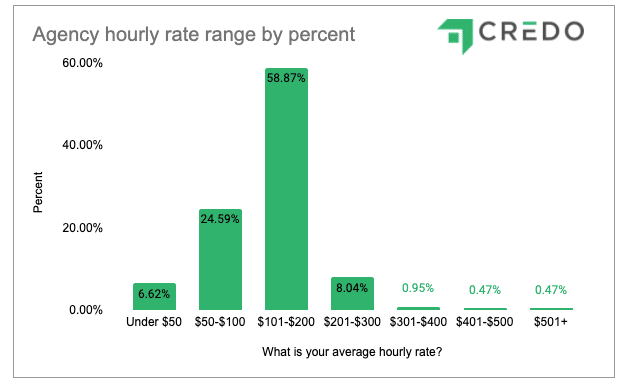
Worldwide SEO Firm Single Project Rates
The average SEO firm charges this much:
- Marketing providers worldwide from our dataset charge on average $112.22 per hour.
- SEO providers charge on average $134.99.
- SEO agencies worldwide charge on average $134.14 per hour (out of 320 survey respondents).
- SEO agencies in the United States charge on average $147.93 per hour.
- SEO consultants worldwide charge on average $139.29 according to our data.
- SEO consultants in the United States charge on average $144.68 per hour according to our data.
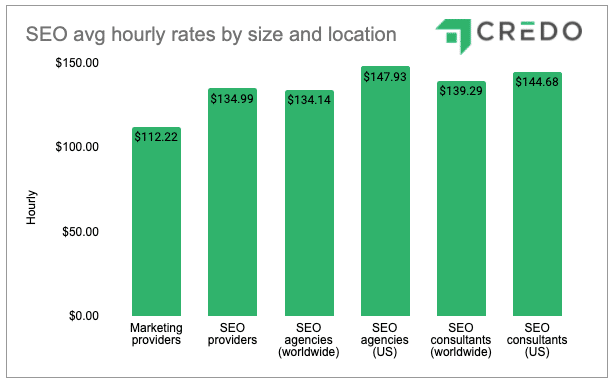
Worldwide Hourly PPC Rates
Here are the highlights of the PPC pricing results, with graphs below:
- Marketing providers worldwide from our dataset charge on average $112.22 per hour.
- The average PPC company worldwide charges $136.85 per hour.
- The average PPC agency worldwide charges $136.87 per hour
- The average PPC agency in the US charges $151.88 per hour
- 84.74% of PPC agencies charge between $50-$150/hr
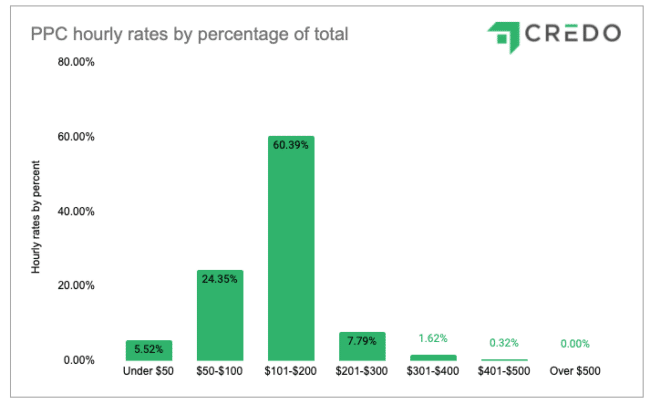
See the challenge with the question about how much it costs to hire a marketing agency? Pricing is all over the place, and for good reason.
Why Pricing Varies (A Lot)
So, why does pricing vary so much and why can’t we establish an industry norm for pricing? One that achieves market equilibrium between those doing the hiring and those offering their services sure would be nice.
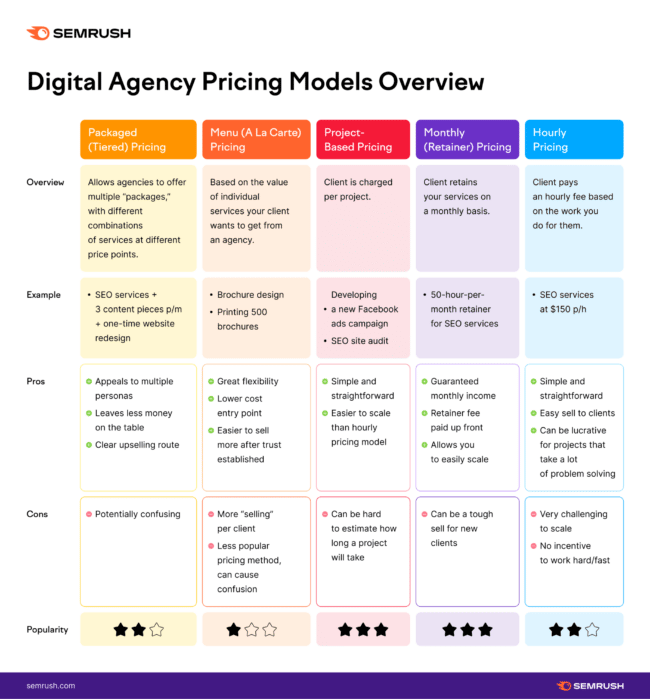
Unfortunately, that does not exist and this is an ongoing struggle for both parties, understandably.
Here are a few reasons why pricing varies so wildly:
- Firm/consultant experience;
- Scope of work;
- Internal costs;
- Industry-specific factors;
- Geographic location.*
*An experienced digital agency in New York City is likely more expensive than one in Manchester, New Hampshire where costs of living are much lower. Keep in mind that you can often find a fantastic agency, at a price point that works for you, if you do not let geography determine what should be a data-driven decision. That’s our specialty.
Agency/Consultant Experience
The first factor is experience. You pay for that person’s past learnings and not for them to learn on the job.
This applies both to outside providers as well as full-time hires.
If you hire someone in-house full-time as an entry-level, you pay them less than a VP/Director because the entry-level person’s skills are less valuable than that senior person’s.
You’re paying them for their experience, which is next to none. You’re paying them to learn and provide more value over time. In this case, you’re spending less money but you’re spending time.
Hold onto those self-starting, quick-learning types. These hires are valuable and hard to find.
The same happens with an outside firm or consultant.
The more specialized the firm is, or the more experience they have in your industry, the more you should expect to pay. Why? They are more likely to reduce the amount of time needed to see tangible results.
When you pay for experience and industry knowledge, that’s what you get. That’s why it costs more.
Scope of Work
Next, is the scope of work.
Especially in the digital agency world, strategy is way underpriced and undervalued.
People want to pay for “doing something”, for action. But this poses problems.
If you start walking in the wrong direction, you’re doing something. But you’ll never reach your destination.
Strategy is often billed at a higher hourly rate than “services rendered”. Depending on what the agency specifically provides, you may be charged more or less than industry averages.
Side note: before you sign a contract you should be crystal clear on if the firm will be providing guidance that you need to then execute internally, or if they will also be implementing the work.
We see too many companies coming to Credo who have been burned in the past because their expectations for what their firm would provide did not match up with what the firm did.
Scope of work can (and often does) also mean the number of hours of time you get from your firm. That includes the type of work they are doing, as well as the number of channels they operate.
The more time, the more it will cost. Makes sense.
The more channels, the more time the work takes.
This is why you may want to look beyond hourly rates when gauging who to hire.
A person with 10 years of experience may (and should) have an hourly rate that is 3x more than someone with one year of experience.
That’s because they can do the work 3x faster and likely with more valuable deliverables and services. This is not a catch-all and you still need to vet an agency diligently.
But experience is generally worth the cost, is the main point – in any vertical or industry.
Internal Agency Costs
Another factor that affects pricing is the agency’s operating costs. In ecommerce, we’d call this their COGs (cost of goods sold).
In the services world, it’s operating costs such as salaries, tools, legal guidance, and more.
Individual consultants usually charge higher prices than an agency because their time is finite. In order to make what they need to make to pay the bills, they have to prioritize who they work with.
The most effective consultants are usually those charging the most because this gives them margin in their work to focus on a few clients instead of trying to appease many.
Otherwise, they spread themselves too thin and the quality of work suffers.
Agencies are slightly different because they are more complex businesses.
They have payroll, tools for which they pay (and likely have multiple seats), benefits, office overhead, and more.
In the case of digital agencies, size does not always matter.
Smaller, boutique agencies that have been around a decade or longer tend to be comprised of highly dynamic, highly compensated experts.
Thus tend to be more expensive than a larger agency, as larger agencies can tap into economies of scale with less experienced employees on accounts.
This can go both ways but skill distribution tends towards this generalization.
Industry-Specific Factors
Another factor that makes it hard to pin down pricing is the specific industry.
For example, travel is an incredibly competitive industry (and becoming even more so every day as Google moves into the search results even more).
To even make a dent in competing and getting noticed in this space, you’re going to have to pay up.
Compare this with a much smaller niche, like organic gardening. There are fewer competitors because there’s less money to be made than in travel. The budget required to enter and corner that industry will be lower.
You can then reason that travel SEO agencies will likely charge a lot more per hour. You are paying for that experience. Looking for a SEO partner who will hit the ground running with a clear strategy.
A travel SEO agency knows the industry and know your customers. They get you engagement, more so than someone familiar with doing content-based SEO or content marketing for an organic gardening publication.
How to Gauge Value Of An Agency Price Model
When you do the research yourself on firms and receive a lot of proposals, they’re going to be all over the map. As noted and as Gary Vaynerchuk echoes, there is no industry standard on this process. (Shakes fist, angrily.)
Some are going to be higher expected. Others are going to be lower.
One agency will pitch you exactly what you discussed with them.
Others will use it as a chance to try to upsell you before they’ve even won your business or shown any results.
When considering pricing, we encourage you to not just look at the top line. You should look at what the price will get you.
This may seem obvious. It is obvious. But alas, people are curious creatures who love to repeat mistakes or ignore those that try to help them solve problems.
We get it. Money is an emotional thing. Naturally, we all respond more negatively to bigger numbers.
But at the end of the day, what you are buying is not “services” but results for your business.
The Cost Of Lower Costs
A cheaper proposal may cost you less, but at what actual cost to your business?
If a budget proposal works for you, you should take into account:
- What they are proposing to do;
- The timeline in which they are proposing to do it;
- Results they have shown from previous clients.
All of these are more important than the cost. It may not feel good or make you feel warm and fuzzy inside, but it is almost always better to pay for quality.
You can buy a cheap pair of running shoes every six months or a quality pair that last years. Cheap out on a new smartwatch and buy another next year. Or pay more for one that lasts, with a warranty to protect your investment.
You get what you pay for in life, and this is doubly (or more) true in marketing as well.
What to Negotiate & What Not to Negotiate
Once you start looking at proposals and figuring out who to work with, you may have some things you’d like to negotiate back on.
But, you may not know what is appropriate to negotiate on and what is not.
In this section, we cover what you should and should not negotiate within a proposal.
What to Negotiate
When making a decision about who to work with, you have the power in your hands.
Proposals are not a “take it or leave it” sort of situation. There are definitely areas that you can negotiate (or at least ask questions about for clarification and potential negotiation). In fact, you should do this.
These include:
- Billing terms and cadence;
- Delivery dates;
- Amount of time required per deliverable/audit;
- Length of engagement.
Let’s talk about each individually.
Billing Terms and Cadence
Every firm bills in different ways. Sometimes their billing cadence is negotiable.
If they say that payment is due before any work begins, you have every right to question this and ask if you can pay on net-30 terms or an initial deposit.
They may not negotiate on this, but it is a question that you can ask. Sometimes they may require the first payment upfront but then future invoices are net-30. A deposit system is also reasonable.
Delivery Dates
Sometimes dates set for delivery of reports do not align with your own schedule or timing for delivering what you need to others on your team or other vendors responsible for work and their own timelines.
Thus, it is completely acceptable to ask for timelines to be sped up or pushed back to keep to your schedule internally. The agency may not be able to accommodate the request, but you are well within your rights to ask.
Amount of Time Required Per Deliverable/Audit
The amount of work required to complete a project may seem either too high or too low for them to do a good job.
It is reasonable to ask what is involved in a deliverable/report and why it is priced the way it is.
The better way to do this, though, is to ask for some examples of similar deliverables they have done and an understanding of what will be delivered to you. Then you can decide if the value is there for you.
Length of Engagement
Different agencies structure their deals differently.
While none is necessarily better or worse for you, you should understand what is being proposed and if that works within your way of working and/or is within your risk tolerance.
It is definitely within your rights to ask if the length of engagement can be shortened. If you don’t need a year contract, that should be easily negotiable.
As with the others above, the firm may not negotiate – especially if their services are in high demand.
Pro tip: if they require a 12-month contract then you should make sure you have a 30 day out in the contract. If you sign a 6-month contract, build in a 3 month out so that you’re not stuck for 6 months if they’re not great to work with. You need a way to get out of a contract early for no penalty if they aren’t meeting pre-defined expectations).
What You Should Not Negotiate
There is really one area that you should not try to negotiate, and that is price.
Digital agencies price themselves the way they do for a reason, usually.
This is usually a well-thought out figure. They know what they need to cover their business costs and pay themselves so that they are not overworked. They also know you won’t be taken for a ride. It’s a balancing act.
This said, there is a way to negotiate if the quote is too much for your budget.
First suggestion, negotiate on scope, not price. The work proposed to you should be for a certain scope of work (number of hours, set of deliverables, clearly defined KPIs and OKRs).
For example, if the cost for 20 hours of work is $4,000 and you only have $3,000 to spend per month, you can negotiate to get 15 hours of work for $3,000.
What this does is allow you to keep within your budget, allow the agency to maintain their required rate, and everyone is happy.
A caveat? Understand that results may not be seen as quickly because the amount of time the agency has to drive the results has been reduced by 25%. These are hard decisions that you as a business owner need to make.
If you need a hand with hiring a digital agency, get started for free right here.
Why to Pay Market Rate for Digital Services
No one wants to pay more than they need to, for anything, ever. Why would you?
The porblem is that in today’s day and age of the internet, you are bombarded by offers that are so cheap that they seem too good to be true.If it seems to good to be true, especially with hiring a digital agency, it usually is.
First, we’ve all received emails or LinkedIn messages from overseas offering SEO for $99/mo. You may waste just a small amount of money, but you’ll also waste time and effort – and still have to go hire someone else.
Second, if you negotiate someone down on their pricing then you are often working against yourself.
How’s that then? You’re working against yourself because you now pay them less than their normal rate. If you were them, who would you prioritize responding to and doing work for?
As a business person, you need to prioritize the one paying you more for the health of your business.
Third, if you pay someone less than they are worth or need then they will have to bring on even more clients in order to sustain their business.
This is a net-negative for you because now attention is split amongst more clients than otherwise would have been necessary.
Fourth, there is an psychological element that plays into the quality of the work you receive. If you talked an agency down 20%, they already feel you don’t value their work. Its not a top concern but its never a good foot to start on.
At the end of the day, you don’t want to be an agency’s lowest paying client. You’ll get less service and probably lower results as a result.
Pay a bit more and extract the most value. Penny pinching when hiring a digital agency is a recipe for disaster for your business. Be diligent in this decision because, as with all things, you pay for what you get.

